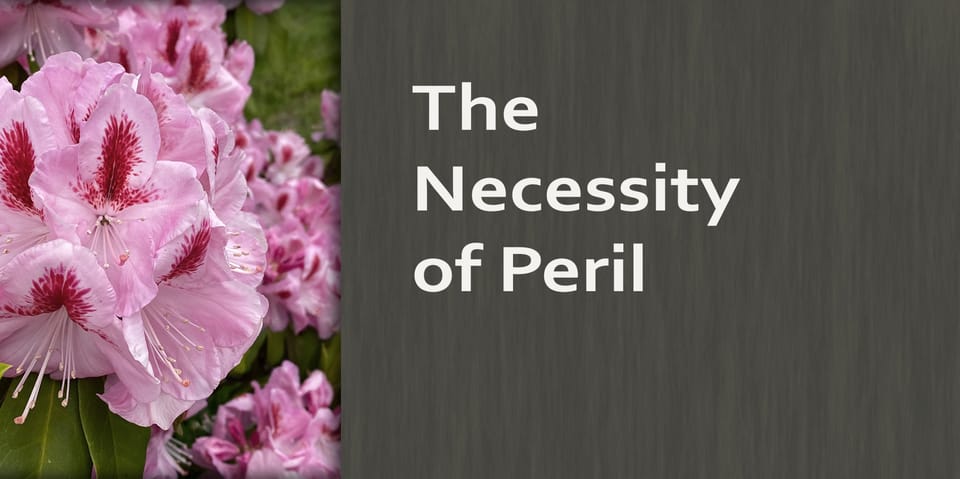THE NECESSITY OF PERIL

Any good story involves peril. It doesn’t have to be physical danger though. It can be emotional danger—that of being humiliated, rejected, grief-stricken, or isolated—yet physical danger is the easiest way to create tension in storytelling and action-packed stories lead the charge in this regard. Perilous Times by Thomas D. Lee is an action-packed story, filled with peril, just like its title promises.

Climate change suggests many pathways for creating life-threatening plots, so that part of writing climate fiction is easy. What is not so easy is generating a story that doesn’t devolve into violence to overcome the danger. Killing the bad guy has always been the solution since the times of myth and legend, but that isn’t the solution we need for the climate crisis. Still, climate fiction has often reached for it. Perilous Times is no different.
The book draws from the major characters in the myth of King Arthur, including the Knights of the Round Table, plus Merlin the wizard, Morgan the witch, and of course, the sword Excalibur. The plot revolves around a spell that Merlin has cast on the legendary knights, compelling them to return from the grave whenever Britain is in peril.

This story is set in the near-future as the climate crisis is unraveling society. Corruption by fossil fuel interests has taken hold. Global heating is creating havoc. Sea levels have risen in low-lying areas, producing refugees. Warring factions have set up in different territories. Life is dismal by all accounts. Since Britain is in peril again, the knights Kay and Lancelot are summoned from their grave to set things right, which to them means sword fights, magic, and killing dragons.
Though a bit on the long side, Lee crafted a skillful story filled with dry British humor, and I was intrigued by his premise, which is why I picked it up. I skimmed quickly through the violent scenes, trying to deduce whether this was just another kill-the-bad-guys story. I was glad to see Lee delve into the question of violence, challenging it as productive and raising the promise that there was another way to finish this. One of his characters, the Arthurian knight Kay, even goes through strong character growth, which causes him to reach beyond lethal solutions to make choices that temper his actions. In the end, though, Lee has created such a chaotic world that it really comes down to a final battle against the bad guys, one which would please the Game of Thrones crowd.

It’s not a book I can whole-heartedly recommend. So why am I writing a review about it? There’s one main reason—it raises a potent question: what will it take to solve the climate crisis, violence or transformation? Can we as humans solve the climate challenge with cooperative, democratic measures or will we devolve into our worst destructive tendencies? This book teases transformation but delivers the violence. The author admits through omission that he doesn’t have a clue what it will take to turn things around without violent revolution. His solution is to rid the world of the corrupt fossil fuel men. After the final battle, the characters hope to get on with the business of transforming society, but Lee doesn’t show how that transformation can take hold when it is born from such violent acts.
While reading this story, it’s hard to not want those fossil fuel barons and their corrupt minions to just disappear. Wouldn’t it be easier to fix things if they weren’t standing in the way? None of us are free of that instinct. It is a violent one that comes easy. It has been part of our stories for ages.
The only other solution is to change these greedy, cruel people into caring, generous ones, but we can’t imagine how that would be possible because it involves transformative strategies that we can barely grasp. Yet, that is the challenge that writers must tackle.
The corrupt, nature-destroying system we currently live in is grounded in dreams based on our worst tendencies. What climate fiction must do is explore stories that will strengthen what is best in us—stories that can create new dreams for humans to aspire to, ones that step beyond the quest for money and fame. These will be stories that push against the norm, and they won’t be embraced, at first, as readily as the stories that echo the myths we have lived with for so long.

Perilous Times is a very commercial story. It will certainly appeal to readers who love good versus evil battles in their books. I imagine those raised on video games will probably love the action scenes, and it may make some of them think about climate change, so I can’t denounce this book. Even so, the book we really need Lee to write is the one that follows from this story. We need one that asks what it will take to change to a more just, equitable society that values nature enough to not destroy it along with ourselves.
We need to envision transformative stories that touch our hearts and lead us to change. I encourage writers and readers to seek them out.
Member discussion